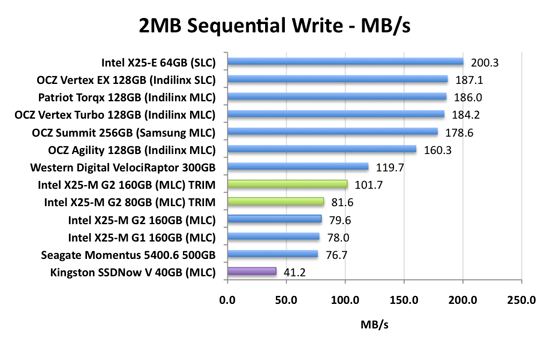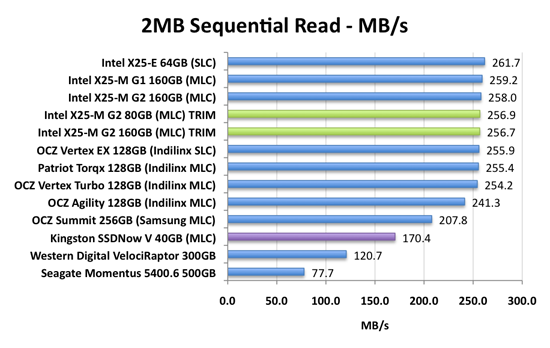The SSD Improv: Intel & Indilinx get TRIM, Kingston Brings Intel Down to $115
by Anand Lal Shimpi on November 17, 2009 7:00 PM EST- Posted in
- Storage
The Test
| CPU | Intel Core i7 965 running at 3.2GHz (Turbo & EIST Disabled) |
| Motherboard: | Intel DX58SO (Intel X58) |
| Chipset: | Intel X58 |
| Chipset Drivers: | Intel 9.1.1.1015 + Intel IMSM 8.9 |
| Memory: | Qimonda DDR3-1066 4 x 1GB (7-7-7-20) |
| Video Card: | eVGA GeForce GTX 285 |
| Video Drivers: | NVIDIA ForceWare 190.38 64-bit |
| Desktop Resolution: | 1920 x 1200 |
| OS: | Windows 7 x64 |
Sequential Read/Write Speed
Using the latest build of Iometer I ran a 3 minute long 2MB sequential write test over the entire span of the drive. The results reported are in average MB/s over the entire test length:

I ruined the surprise earlier, but the X25-M G2 160GB can now write at speeds of up to 100MB/s. The 80GB version doesn't get the benefit. The rest of the SSDs are approaching 2x that performance however. The poor Kingston drive is limited by its 5-channel implementation and barely manages more than 40MB/s. This will keep the Kingston SSDNow V series from cannibalizing X25-M sales, while at the same time offering a taste of what good SSDs have to offer at lower price points.

We're nearly tapped out on sequential read speed. The new TRIM firmware appears to drop performance a bit but not much. SATA 6Gbps will be necessary before we can see higher sequential read speeds from a single SSD.
True to Kingston's claims, the SSDNow V 40GB pulls around 170MB/s thanks to its narrower configuration. Not within arm's reach of the more expensive SSDs but still much faster than a mechanical drive.










162 Comments
View All Comments
Tuvok86 - Wednesday, October 28, 2009 - link
oops, I meant40GB - (Intel Controller, 34nm Intel MLC NAND, 32MB Cache)
Tuvok86 - Tuesday, October 27, 2009 - link
I don't like how Kingston labelled this drive as v-series, this may lead people to think that v-series 64gb and 128gb are good as well, while they end up buying a JMicron crap...I know that the v-series stands for value but I'd expect a kind of consistancy in series parts.I'd expect 64 and 128 drives to perform equally or better than the 40gb part, but it wouldn't...perhaps kingston had to find a sloppy way to get rid of those unsold "value" drives...
Regarding ssd reliabilty brought up in the recent posts, I'd be pretty confident to put an SSD in a home pc anytime.
Man, they are used for SERVERS (well, SLC drives actually, but the story is the same), one of the most mission critical environment out there.
Dangers are ahead only if you want to mess trying TRIM, fw updates or any other topic brought up every now and then, but if you wait a while and resist early-adopting new features for a couple days, problems are issued quickly. Anyway backup is just a click away.
clarkn0va - Wednesday, October 28, 2009 - link
I would like to see tests on the JMicron-based Kinston V Series. Supposedly their newer controller resolves the stuttering and random access bottleneck of the gen-1 SSDs.I installed one in a budget build for a customer and was very impressed with performance in a modest use case scenario (with Windows xp and an Atom 330). I would have no reservations using these drives in future builds, although the new 40GB model is an interesting proposition.
clarkn0va - Wednesday, October 28, 2009 - link
I do agree though that the V Series branding is confusing and misleading, in light of the different controller. True to Intel tradition.The0ne - Tuesday, October 27, 2009 - link
Seems not enough testing was done for them to have data corruption, again. These kind of issues shouldn't really surface if proper testing were carried out :/mantis2000 - Tuesday, October 27, 2009 - link
"Would I recommend waiting until next year to buy? This is one of the rare cases where I'd have to answer no."Given all of the serious reliability issues -- including today's latest Intel firmware debacle -- it's quite clear that SSD are not ready for prime time. Over and over again, we hear stories about disks not living up to their potential due to bad drivers or firmware, and there have been far too many cases of total failure with attendant catastrophic data loss.
How can Anand recommend using a SSD on a primary machine?
Wait at least a year for the bugs to be worked out if you value your data.
Griswold - Wednesday, October 28, 2009 - link
Bullshit. What reliability issues? What firmware debacle? The handful people with potentially bricked devices after the flash hardly qualify as a debacle. I would guess the success rate is over 90%. Flashing is always a risk, you know...Intel did the right thing by pulling the firmware, though. They'll look into it. But i wouldnt be surprised if it wasnt an error on their end - they spent lots of time making this firmware. Much, much more than the garbage the competition throws and its customers every week.
drwho9437 - Wednesday, October 28, 2009 - link
I find the statement that flashing is always a risk on a drive based on flash memory very ironic.I should think they could spare the space for a backup firmware if it is as you say.
GullLars - Tuesday, October 27, 2009 - link
I've heard this argument for years now, along with quite a few others that have died away. "SSDs are not ready for prime time". Wich SSDs, and for what usage are they not ready compared to HDDs?Unless you yourself upgrade the firmware of an SSD whitout first waiting and making sure the upgrade is safe, there is no risk by using SSDs that is not greater with HDDs. SSDs generaly are much more reliable and rugged, and when they near the end of their natural life, you will see the raw data failrate predictably increase until it hits the point where the ECC can't do the job anymore, before wich point you take backup and buy a new one.
Anyone who keeps invaluable data on just one physical medium whitout backup would be a fool to think it is safe. Use the SSDs for OS + programs and have a RAID in a redundant mode with offsite backup for your valuable data.
Anand is IMHO right to recommend buying an SSD now and not waiting because we have passed the point where the ratios between price, capacity, performance, and reliability make them far superior to harddisk for boot drives. I've had SSDs for over a year in my computer, and payed a hefty price for being an early adopter, but it was well worth it. The prices, specs, and reliable market today almost make me laugh out loud when people say "SSDs are not ready yet". Claiming "(many) people are not ready for SSDs yet" would be far more accurate.
sotoa - Tuesday, October 27, 2009 - link
The firmware was there this morning and now it's not available? Anyone else see this?